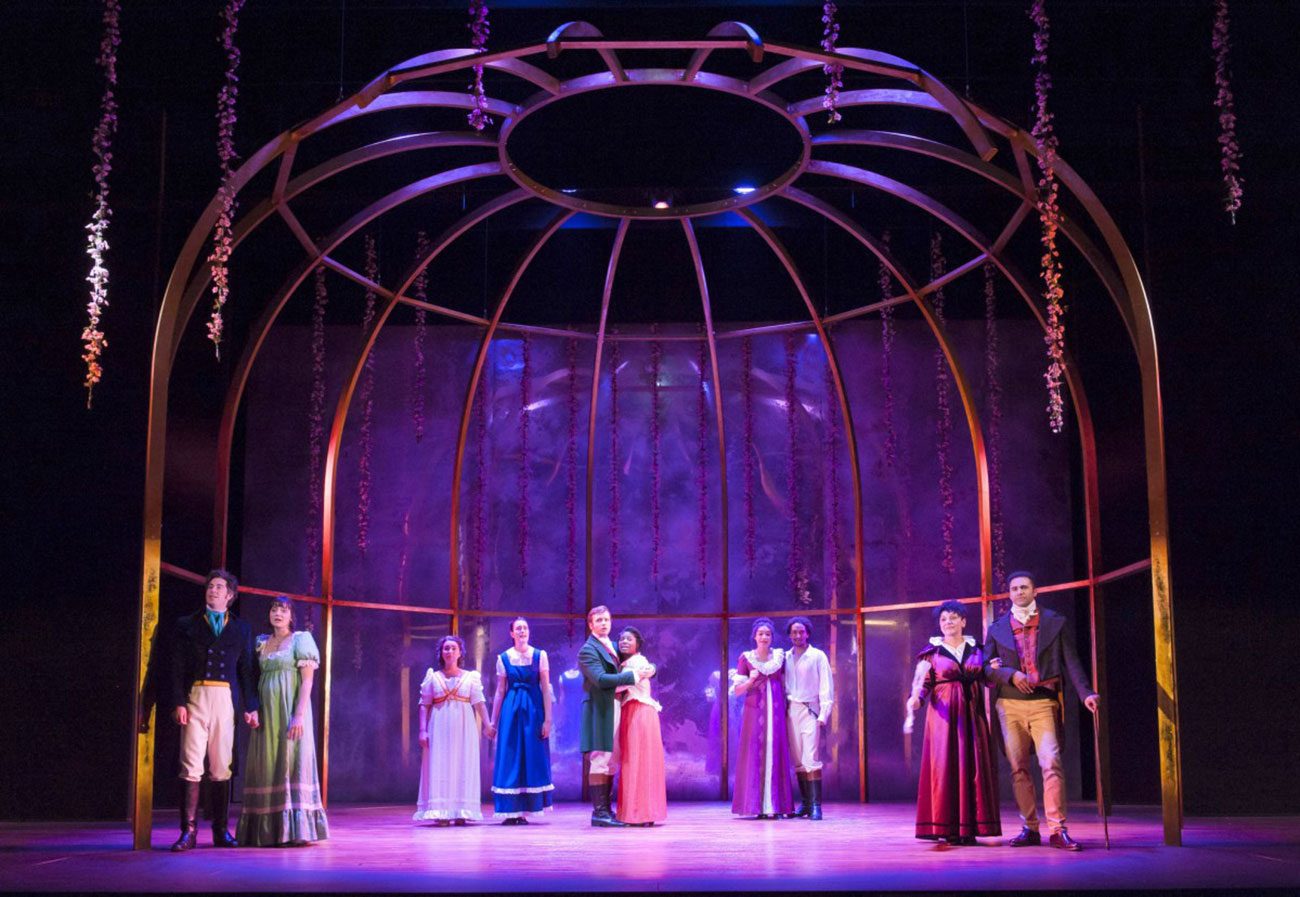What a grand time Jane Austen has had of late! The improv ensemble Austentatious is wowing audiences across the UK; Austen’s various bicentennials have been commemorating original publication dates, and her death.
There have even been book and film mashups with zombies of this, her most enduring work.
However, for this brilliant new retelling of Pride & Prejudice, director Susannah Tresilian, writer Sara Pascoe and composer Emma-Lee Moss have returned to the source: a tale of snooty Mr Darcy (pride) and quick-to-judge Elizabeth (prejudice).
The creative team recalled reading a comedy in their youth, but instead found a sort of tragedy, some aspects all too familiar: males with far more social and economic power; the wealthy living lives of ease.
Where was the funny? When did Darcy take off his shirt?
Trapped in a cage
[arve url=”https://youtu.be/aShovUyTnYs” title=”Trailer for Pride And Prejudice” /]
In Austen’s time, women were infantilised and ‘owned’ by one male or another. Arguably, we are still: whose last name do you have, ladies? How often are 30 year old women called ‘girls’?
Biological determinism traps the Bennett girls. Their only hope is to find a new guardian before their father dies and leaves them destitute, with everything going to the next male relation.
Their gleeful cousin Mr Collins (Matthew Romain: also the loving Bingley!) can barely wait to inherit the house and toss the women out: “Not for a few years…. at least!” he crows cheerfully.
One hesitates to call attention to the colour-blind casting: like recent theatre productions of Annie and Harry Potter, choosing the player for ability is refreshing and should pass unremarked.
And yet, this accentuates the equality of the traps: for women; for non-inheriting younger sons; for peasants, who could choose to marry who they liked but could also be turned off enclosed land; for anyone without means.
Indeed all action takes place within a large birdcage: windows shifted from one segment to another; tables and sofas brought in and out between bars. The characters are as trapped as parakeets.
Every actor is perfect

Explanatory songs as well as monitors and chalkboards add modern commentary and permit us to interrogate historic elements that have, thankfully, passed.
Brief, contemporary intrusions slide in and out of the birdcage: lecturers expounding on what Austen ‘meant’; a tutor attempting to explain how Elizabeth and Jane Bennet are doing the best they can within traps society has laid for them. One begins to understand Mrs Bennet (a fiery Kerry Peers) at last.
In one early meta-theatrical incursion, a teacher examines the first line of Austen’s novel, which famously avers a single man must be in ‘want of a wife’, by asking: “Can anyone tell me what heteronormative means?”
Every actor is perfect. One hopes this same team will, somehow, play these characters for years, giving as many people as possible a chance to see this play.
Clever comedy
Special kudos to the professional debut of Rachel Partington as batty Mary Bennet, and to the luminous Bethan Mary-James as calm, fearless Elizabeth.
The irascible Mr Bennet, at turns annoyed by constant talk of inheritance and money, and then supportive of his girls, is inhabited by Adrian Irvine.
Giddy Kitty (Alice Haig) and Lydia (Olivia Onyehara) run amok; sweet, brave Jane (Rebecca D’Souza) smiles despite all; Mr Wickham (Alex Sawyer) plans and schemes and, hilariously, as the modern actor reading the script, thinks he is ‘the star’ of the play.
And of course, Mr Darcy (Matt Whitchurch) is as fumblingly arrogant as ever, until he melts.

This is clever comedy and strikes the right balance irony and hilarity: the humour is not too broad (but often laugh-out-loud funny), yet mindful of the dire fate of an unwed, unclaimed female.
True, an impoverished male could only turn to war: but he had that option. This production is an homage to Austen herself, modernised.
You think you know Austen? Think again! Don’t let your prejudgement of the story stop you.
Stellar cast: all amazing. Great comedic writing, brilliant timing, and yet the truth of the story remains: unwed females had nowhere to go, if the family house passed to a callous relative.
Run, don’t walk, to York Theatre Royal and see if any tickets remain for this new production of Pride & Prejudice.
The run ends here in York. Theatre is ephemeral: like human life. Not the Austen from your teens. Unmissable: Just go.


